Happy Monday! After a busy weekend of games—including Auburn’s memorable victory over Michigan State to advance to the Final Four—Chestbrockwell1967 and J. Fuqua are tied for first place in the TMD pool, followed by RedRaiderDad51, travbradburn, and romann233. We wish we had thought to pick the four No. 1 seeds to advance!
Our Dispawtch bracket has also entered its own Final Four. Who will take home the inaugural championship: Tesi, Meeko, Gus, or Molly? Cast your vote for today!
Quick Hits: Today’s Top Stories
- More than 1,700 people have died as a result of a 7.7 magnitude earthquake in Burma on Friday, the country’s ruling junta said Sunday. In Thailand, where the strong tremors caused the collapse of high-rise buildings, at least 18 people have died. The death tolls are expected to rise significantly as rescue teams continue to search the rubble in both countries. International aid groups arrived in Burma over the weekend in an effort to stave off a humanitarian crisis in the impoverished Southeast Asian nation, which in recent years has reeled from an ongoing civil war following the 2021 military coup. On Saturday, Burma’s main armed opposition group declared a two-week ceasefire in an effort to ensure aid shipments to areas of the country under its control.
- Hundreds of thousands of protesters gathered in cities across Turkey on Saturday night to call for the release of jailed opposition leader Ekrem İmamoğlu, the chief political rival of President Recep Tayyip Erdoğan. The ousted Istanbul mayor was arrested pending a trial on corruption charges earlier this month, days before being named the presidential nominee of the country’s Republican People’s Party last week. Turkish authorities have detained nearly 2,000 people—including several journalists—in the ongoing demonstrations, which began following İmamoğlu’s initial arrest nearly two weeks ago. Police have also used pepper spray, water cannons, and tear gas in an effort to disperse the mass protests, while Erdoğan denounced the pro-democracy rallies as “street terrorism.”
- The Israeli military carried out airstrikes on Hezbollah targets in southern Beirut on Friday, the country’s first attack on the Lebanese capital since November. The operation came in response to Friday rocket fire on the northern Israeli city of Kiryat Shmona, one of the communities whose residents have begun to return home after being evacuated for more than a year. The Israeli airstrikes also targeted the Iranian-backed terrorist group’s command centers, rocket launchers, and fighters in multiple locations across southern Lebanon. The resumption of cross-border attacks risks upending a November ceasefire agreement between Israel and Lebanon.
- The Taliban on Thursday released Faye Hall, an American woman who had been held in Afghanistan since February. Hall, who was arrested on charges of using a drone without authorization, is the fourth American to be freed from Afghanistan since January. The Taliban released George Glezmann, a Delta Air Lines mechanic, earlier this month after more than two years. On Wednesday, the U.S. lifted millions of dollars of bounties on three leaders of the Taliban’s Haqqani network, a U.S.-designated foreign terrorist organization.
- Vice President J.D. Vance visited Greenland on Friday amid President Donald Trump’s push to annex the Danish territory. Vance focused on security and economic development during the trip, promising to “respect [the] sovereignty” of the Arctic island should it pursue independence from Denmark. However, Trump appeared to contradict the vice president a day later, telling NBC News that the U.S. would “get Greenland.” Meanwhile, on Sunday, Greenland Prime Minister Jens Frederik Nielsen rejected the American president’s remarks: “Let me make this clear: The U.S. is not getting that. We don’t belong to anyone else. We decide our own future.”
- Someone set fire to the entryway of the Republican Party headquarters in Albuquerque, New Mexico, on Sunday in what authorities believe was a deliberate act of arson. In addition to the fire, the words “ICE = KKK” were spray-painted on the building. “This horrific attack, fueled by hatred and intolerance, is a direct assault on our values, freedoms, and our right to political expression,” the New Mexico GOP said in a statement. The fire followed a series of recent arson incidents targeting Tesla vehicles from Kansas City, Missouri, to Toulouse, France.
- President Trump announced Friday that Skadden, Arps, Slate, Meagher & Flom—a prominent New York-based law firm—had agreed to provide more than $100 million in pro bono legal services in support of several Trump administration initiatives. The move, which Trump described as “essentially a settlement,” allowed Skadden to sidestep the president’s campaign of executive orders targeting five other top law firms so far. Also on Friday, two federal judges issued temporary restraining orders halting the implementation of parts of Trump’s orders singling out the firms Jenner & Block and WilmerHale. Earlier this month, a federal judge temporarily barred Trump from executing parts of a separate order targeting the Perkins Coie law firm.
- Defense Secretary Pete Hegseth sent a memo to members of the department’s leadership on Friday giving them until April 11 to submit proposals to “realign” the size of the Pentagon’s civilian workforce. Hegseth said the move, which reopened the deferred resignation program and offered early retirements to all “eligible personnel,” aims to “reduce duplicative efforts and reject excessive bureaucracy.” Last month, the Trump administration announced plans to cut the Pentagon’s 950,000-employee civilian workforce by 5 to 8 percent.
- The Federal Reserve’s preferred measure of inflation, the personal consumption expenditures (PCE) price index, increased 2.5 percent year-over-year in February, the Bureau of Economic Analysis reported Friday—the same annual rate from one month earlier. After stripping out more volatile food and energy prices, core PCE increased at a 2.8 percent annual rate in February, exceeding economists’ expectations. Consumer spending, meanwhile, grew 0.4 percent last month—a smaller-than-expected increase.
Trump’s ‘Liberation Day’ Looms
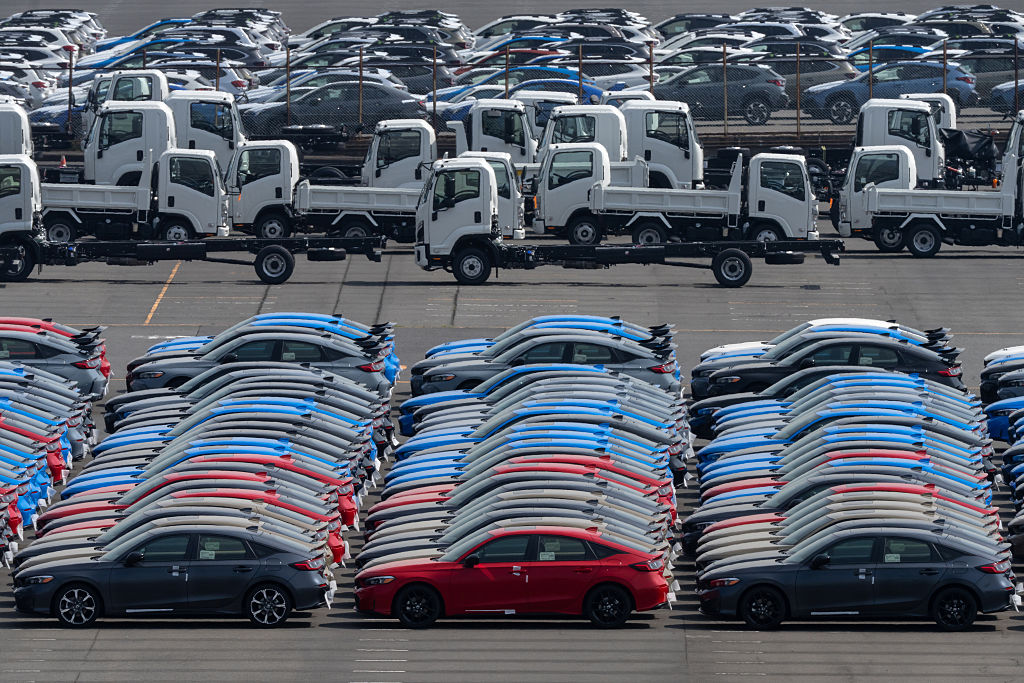
In a December 2018 Twitter thread criticizing China for its unfair trade practices, President Donald Trump declared himself “a Tariff Man.” But back then, the conventional wisdom was that this sort of tough talk was all bark and no bite. Trump implemented a series of tariffs during his first term, but the duties represented a significantly pared-back version of the trade war he had initially envisioned.
Now, as the president promises to enact sweeping tariffs on a range of U.S. trade partners this week, gone are any assurances that Trump’s threats are mostly bluster. On Wednesday, President Donald Trump announced plans to impose 25 percent duties on foreign cars and car parts, effective April 3 at 12:01 a.m. ET. He has also vowed to correct trade imbalances through so-called reciprocal tariffs on goods from multiple countries, dubbing April 2 “Liberation Day,” when Americans will be freed from the yoke of purportedly abusive foreign trade practices.
Facing fewer political obstacles, armed with a more energized and ideologically aligned administration, and unconcerned with re-election (recent third-term talk notwithstanding), Trump’s dream of revitalizing American manufacturing may be getting its first crash test (pun intended). And early indicators are not looking good, as American firms brace for the economic pain of Trump’s levies and retaliatory measures from international trading partners.
The Dow Jones Industrial Average fell 1.7 percent on Friday, its largest percentage decrease since March 10. The S&P 500 fell almost 2 percent, while the Nasdaq composite slid 2.7 percent. But neither the battered stock market nor souring consumer sentiment appears likely to knock Trump off course. Asked by NBC News’ Kristen Welker on Sunday whether he’s concerned about foreign automakers jacking up their prices in response to the duties, the president responded: “I couldn’t care less if they raise prices, because people are going to start buying American-made cars.”
But foreign manufacturers aren’t the only victims of the auto tariffs, which level a tax on imported car parts in addition to cars themselves. With very few exceptions, “I don’t really think that there’s any car made in the United States that doesn’t have at least some parts that come either from Mexico, Canada, Brazil, or South Korea,” Peter Simon, an economics professor at Northeastern University, told TMD.
Nor is there a clean distinction between which parts are “American” and which are not. Linamar, a Canadian firm that makes transmission modules for cars sold in the U.S., is a case in point: Steel scraps are sent from Canada to Pennsylvania—and then Ohio—to be made into a “hub,” which then travels to Ontario, where it’s combined with a gear-shifting component made in Illinois. The product is then housed in an aluminum module made in Canada and later put into a transmission in a factory in the Midwest. It then crosses the border twice more, once to be inserted into a car in a Canadian dealership and then again to be sold in the United States.
The auto industry is full of such examples, with Audi and Mercedes-Benz plants in the Southeast deeply integrated with Mexican supply chains and the Detroit automotive industry enmeshed with Canada. “[Trump’s tariff] is a measure that completely undermines the integration of the region’s production chains, chains that have been formed over 30 years,” Rogelio Garza, the president of Mexico’s auto-industry trade association, said Thursday.
American automakers, on the other hand, have approached the duties with cautious optimism. “U.S. Automakers are committed to President Trump’s vision of increasing automotive production and jobs in the U.S.,” said Matt Blunt, the former Missouri governor who now serves as president of the American Automakers Policy Council, a trade association that represents Ford, General Motors, and Stellantis. But “it is critical that tariffs are implemented in a way that avoids raising prices for consumers and that preserves the competitiveness of the integrated North American automotive sector,” he cautioned.
For automakers, the unpredictability of Trump’s tariffs is arguably as disruptive as the tariffs themselves. Earlier this month, for example, the president announced a last-minute temporary exemption for cars and parts that comply with the terms of the U.S.-Mexico-Canada (USCMA) trade agreement, a move applauded by American companies. The current executive order also leaves considerable wiggle room on that front, declaring that USMCA-compliant parts would remain exempt until the Secretary of Commerce creates a process for taxing their “non-U.S. content.”
No one is sure how long that process will take, nor what “non-U.S. content” precisely means. And in the business world, uncertainty breeds hesitancy, meaning companies are pulling back from making investments. A survey of chief financial officers conducted by Duke University and the Federal Reserve Bank of Richmond, released Wednesday, found that nearly a quarter of firms surveyed planned to cut back on hiring and investment in 2025 due to the administration’s trade policy. “Nobody is going to be willing to enter into a long-term agreement with another company or country, given the volatility of his daily decisions,” Simon said.
Trump has often left open the possibility that tariffs are simply a negotiating tool. “Maybe I’ll give them a little reduction in tariffs or something to get it done,” he said on Wednesday, in reference to his administration’s attempts to convince China to sell ByteDance, TikTok’s parent company. He also initially delayed some tariffs on Mexican and Canadian goods in February, citing border security concessions made by the countries.
Uncertainty abounds, though, as an even wider array of tariffs stands to be implemented on “Liberation Day.” Trump has threatened “sectoral tariffs” on products like computer chips, lumber, and copper, and also frequently promises “reciprocal tariffs” on every foreign country that taxes U.S. exports. But what exactly those will look like remains deeply unclear.
The befuddled reportedly count many of Trump’s allies among their ranks: “No one knows what the f**k is going on,” a “White House ally” told Politico last week. Trump has been coy about the exact contours of his policies, telling reporters last week that his tariffs could be “somewhat conservative” and neglecting to inform the public on which of the already-imposed tariffs on Mexico and Canada (originally declared in February and eventually delayed until April 2) will actually go into effect. A White House official said last week that reciprocal tariffs were “TBD.”
Many countries are already preparing for the worst. European Union diplomats, for example, are reportedly expecting a flat, double-digit tariff on all goods to be implemented on April 2—on top of already-existing tariffs on steel and oil. Others are at least trying to project confidence: “We’ve been through this three times; this would be the third,” Mexican President Claudia Sheinbaum said Wednesday. And others are spitting mad: New Canadian Prime Minister Mark Carney declared Canada’s old relationship with the U.S. “over” on Friday, promising retaliatory tariffs that would hit the U.S. with “maximum impact.”
The EU has already announced that, if Trump’s trade war continues, the bloc will implement coordinated punitive tariffs targeting the American economy. Canada also has a plan to target industries in relatively Republican states, such as Harley-Davidson in Wisconsin or bourbon in Kentucky.
While you can never rule out a last-minute deal when it comes to Trump, the president and his allies appear fully committed to some kind of trade war, expecting significant gain to come of all the pain. On Saturday, Vice President J.D. Vance lashed out at a right-wing commentator who criticized Trump’s trade policy on X, describing the conservative movement’s embrace of free trade as “brain-dead liberalism pretending to be conservatism.” The “United States absorbs much of the producer surplus of the world,” Vance argued, producing a system that left the U.S. economy vulnerable to economic shocks.
Autoworkers’ unions also cheered Trump’s moves. “We are heartened by the significant measures they have announced today,” the United Autoworkers said in a statement on Wednesday, “and we urge the administration to take similar action to protect and reshore the heavy truck sector.”
But economists are more skeptical of the Trump administration’s ability to deliver on its promises. “Every president, the last 10 of them, promised to bring back manufacturing, and none of them were able to do it, with good reason,” Simon argued. The hypothetical benefits that would come from a mass reshoring of manufacturing are already being superseded by very real losses. As the auto industry prepares for more expensive input prices, it has scaled back expectations of production. Already, American steelmaker Cleveland-Cliffs has laid off 1,200 workers in Minnesota and Michigan. The company has voiced support for tariffs as a way to undercut foreign competition, but its share price dropped nearly 10 percent over the past week.
If the stock market’s and economists’ gloomy predictions are correct, consumers will soon be feeling the pain. Will anything, or anyone, make the president back off? His fellow Republicans seem disinclined to do so, even though Trump is issuing tariffs based on powers delegated to him by Congress, which it could revoke at will.
On Saturday, Trump said that the U.S.’s new tariff regime was here to stay. “Absolutely, they’re permanent,” he said. Maybe the uncertainty won’t last so long, after all.
Today’s Must-Read
During a career that lasted seven decades, Frank Lloyd Wright totally revolutionized architecture, spurning the Neo-Classicism that the upper classes had decreed to be official “good taste” in the 1890s, and offering instead a style that was at once futuristic and welcoming. He became not only the greatest architect in American history, but the only one many Americans today can immediately name. Wright agreed with 17th-century English architect Sir Christopher Wren that a nation’s values are reflected in its buildings, and that buildings can, in turn, shape the public’s social and political attitudes. But where the monarchist Wren believed in using architecture to propagandize about tradition and authority, Wright aimed to do the opposite.
Toeing the Company Line
Commanding His Own Reality
The Unitary Theory of Donald Trump is that Trump isn’t that hard to figure out.
Hindu Nationalism Is Not India’s Version of Christian Nationalism
If Christian nationalism is about christianizing the nation, Hindu nationalism is more about nationalizing the Hindus.
Elimination of Economic Advisory Groups Raises Alarms
The Trump administration is ending input from experts that enhances the accuracy of federal statistics.
Trump’s ‘Iron Dome for America,’ Explained
The nation’s size makes implementation of such a missile defense system difficult and costly.
To Gen Z, Emotions Are Kinky
Traditional romance is back. But there’s a twist.
Laughing on the Right
How comedians, podcasters, and internet trolls helped Donald Trump retake the White House.
The Monthly Mailbag With James P. Sutton
Our TMD reporter answers your questions.
National Security Used To Be a Thing
‘I reserve the right to be Jeff Goldberg.’
On Mobs and Mobsters
It will keep getting stupider.
Trump’s Deportations Are ‘Performance Art
Plus: The former ambassador’s reaction to the Signal saga.
Worth Your Time
- On Sunday, several freed Israeli hostages, including Yarden Bibas—whose wife Shiri and two young sons, Kfir and Ariel, were murdered in Hamas captivity in November 2023—sat down for wide-ranging interviews with CBS News’ Lesley Stahl on “60 Minutes.” During the conversations, the former abductees recounted the extreme physical and psychological abuse they endured at the hands of their terrorist captors. “They were all murdered in cold blood, bare hands,” Bibas said of his family members. “[Hamas] used to tell me, ‘Oh, doesn’t matter. You’ll get a new wife. Get new kids. Better wife. Better kids.” Another hostage, Israeli-American Keith Siegel, recalled living in tunnels with sparse food or water. “The terrorists became very mean and very cruel and violent. Much more so. They were beating me and starving me,” he said. “They would often eat in front of me and not offer any food. … I felt that I was completely dependent on the terrorists, that my life relied on them—whether they were going to give me food, bring me water, protect me from the mobs that would lynch me.”
- OpenAI CEO Sam Altman recently shared a short story produced by artificial intelligence, claiming his company had trained “a new model that is good at creative writing.” For The Drift Substack, Max Norman walked through the 1,200-word story with the eyes of a literary reviewer—and his appraisal was not generous. “Altman wrote that the model ‘got the vibe of metafiction so right.’ But that’s like saying that Trump Tower gets the vibe of Versailles so right. … The narrator declares itself to be ‘a democracy of ghosts’—an evocative phrase, and one lifted straight from [Vladimir] Nabokov’s Pnin. This fossil of human, and copyrighted, writing is perhaps the only interesting metafictional moment in the piece,” Norman wrote. “For humans, imitation and originality often go hand in hand. Good writers match their mastery of language and form, learned in part by studying their predecessors, with a mastery of observation and feeling. The former without the latter can only yield cliché: prose unenlivened by uniquely real experience. As literature, this story is dead on arrival.”
Presented Without Comment
New York Times: Trump Says He’s ‘Not Joking’ About Seeking a Third Term in Defiance of Constitution
President Trump did not rule out seeking a third term in office on Sunday, telling NBC News that he was “not joking” about the possibility and suggesting there were “methods” to circumvent the two-term limit laid out in the Constitution.
…
On Sunday, after the release of the interview, the White House reiterated Mr. Trump’s point that he was focused on his current term, and added that it was “far too early to think about” the idea.
“Americans overwhelmingly approve and support President Trump and his America First policies,” Steven Cheung, the White House communications director, said in a statement.
Also Presented Without Comment
New York Times: California Governor Newsom Says the Democratic Brand Is ‘Toxic’
Also Also Presented Without Comment
People: RFK Jr. Mercilessly Fat Shames West Virginia Governor at Live Joint Appearance
Health and Human Services Secretary Robert F. Kennedy Jr. appeared in West Virginia on Friday, March 28, to discuss the state’s health initiatives—but also made a few rude remarks at Governor Patrick Morrisey’s expense.
…
“I said to Governor Morrisey the first time I saw him, I said, ‘You look like you ate Governor Morrisey,’” Kennedy recalled. “There was a lot of talk about getting healthy again, and I’m very happy that he’s invited me to be his personal trainer,” he said before the crowd laughed.
In the Zeitgeist
The first new Mumford & Sons album since 2018 was released on Friday—and it was worth the wait. Here’s the lead single, “Rushmere.”
Let Us Know
Do you think Donald Trump’s tariff regime is here to stay?

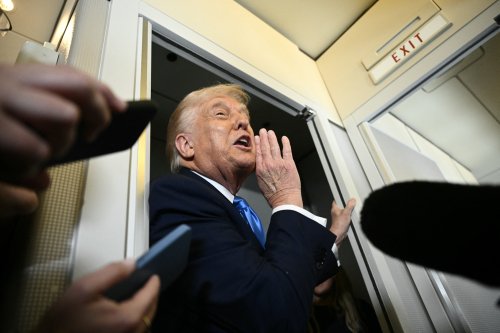


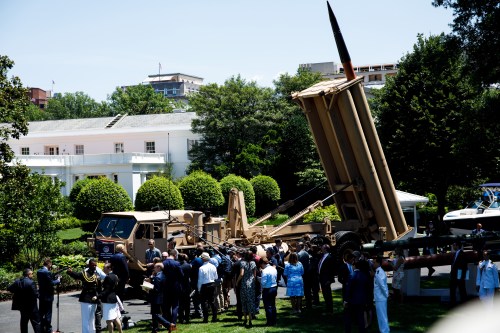



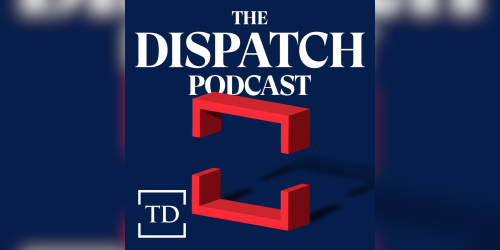
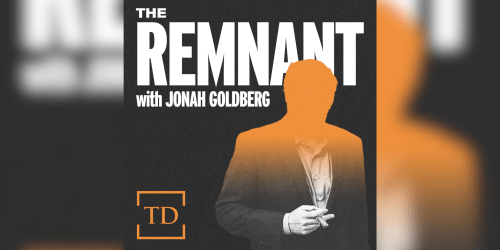


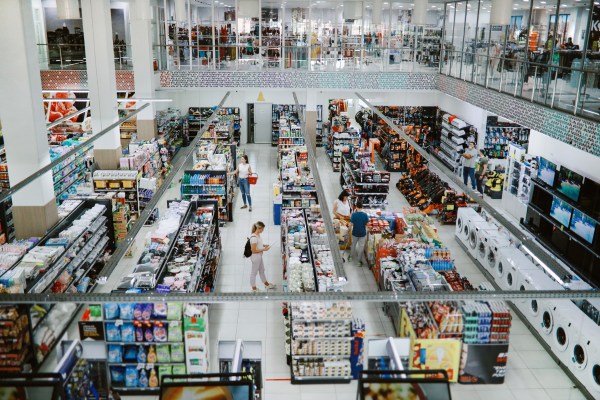

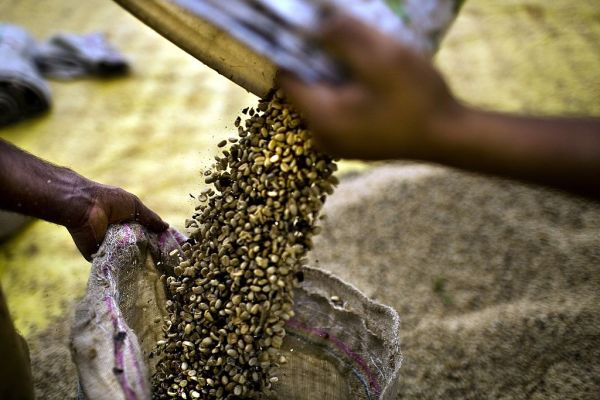

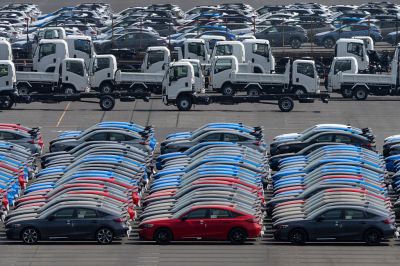
Please note that we at The Dispatch hold ourselves, our work, and our commenters to a higher standard than other places on the internet. We welcome comments that foster genuine debate or discussion—including comments critical of us or our work—but responses that include ad hominem attacks on fellow Dispatch members or are intended to stoke fear and anger may be moderated.
With your membership, you only have the ability to comment on The Morning Dispatch articles. Consider upgrading to join the conversation everywhere.